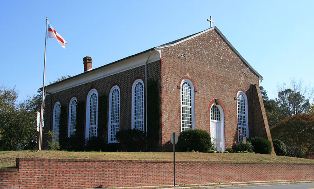 BELTSVILLE, Md. (AP) -- With Maryland poised to legalize gay marriage, some conservative opponents and religious leaders are counting on members of their congregations, especially in black churches, to upend the legislation at the polls this fall.
BELTSVILLE, Md. (AP) -- With Maryland poised to legalize gay marriage, some conservative opponents and religious leaders are counting on members of their congregations, especially in black churches, to upend the legislation at the polls this fall.
Many African American church leaders oppose gay marriage in the liberal-leaning state that's nearly one-third black, and President Barack Obama's re-election campaign is expected to drive many of their congregants to the polls. Opponents submitted draft language for a ballot referendum to overturn the measure just after it passed the Legislature last week. Gov. Martin O'Malley was expected to sign the bill into law Thursday.
Over the weekend, some pastors at predominantly black churches were already using their sermons to shop the referendum effort to their congregations, asking members to sign up for email alerts, put their name on petitions and overturn the law come November. The Catholic Church, which has 1.2 million parishioners in Maryland, has also openly opposed the bill.
A Sunday service at the Hope Christian Church in Beltsville was filled with murmurs of agreement as a spokeswoman for the Maryland Marriage Alliance rallied the mostly black congregation against the law.
"We will have the last say on how marriage will be defined in Maryland," spokeswoman Dee Powell shouted repeatedly to the audience of several hundred.
Some churchgoers said they are bound by their faith to vote against gay marriage. There is no other option for DeBorah Martinez, who lives in Silver Spring and has been attending services at Hope Christian for three years.
"It's a personal value and opinion. It has nothing to do with President Barack Obama," Martinez, 54, said. "We serve the Lord. It's not Barack Obama, so we would not be voting because of that."
When a gay marriage bill fell short in the legislature last year, black pastors were given much of the credit for pressuring lawmakers to oppose it. Catholic leaders also expressed vocal opposition to that measure, which was pulled from the floor of the House as leaders realized if fell short of the needed votes.
Opponents will need to collect nearly 56,000 valid voter signatures, equivalent to 3 percent of the people who cast ballots in the 2010 gubernatorial election, to put the measure on the November ballot. Even gay marriage advocates expect the referendum to end up on the ballot.
Six other states and Washington, D.C., recognize gay marriages. Washington State's new gay marriage law is scheduled to take effect in June, but voters there are also expected to petition the measure to referendum this fall.
Maine legalized the unions for same-sex couples in 2009, but later that year became the only state overturn a such a law passed by a legislature.
Meanwhile, about 30 states have constitutional amendments that seek to prohibit gay marriage, most by defining marriage as between a man and a woman.
Donald Norris, chairman of the department of public policy at the University of Maryland, Baltimore County, said black churches could heavily influence the referendum at the ballot, but liberal voters who are also likely to come out in support of Obama, could offset the votes against same-sex marriage.
A number of factors could tip the vote on a referendum, Norris said. For example, a weak Republican presidential candidate could mean conservative voters stay home and don't cast ballots against the law.
"It's going to really depend upon a variety of things that are going to happen between now and November," Norris said.
Gay marriage advocates are hoping that young voters - whom they expect to support their cause - will turn out for Obama as they did in 2008.
"I think Obama's election turns out a number of different people," said Sultan Shakir, campaign manager for Marylanders for Marriage Equality, a coalition of gay rights groups that worked to get the bill passed. "(There is) a lot of attention around people who attend church, but there are plenty of other demographics who are going to be turned out."
The advocates also think it is inappropriate to leave what they consider a civil rights issue to the discretion of voters.
"It's sad to me that anyone would think that it's OK to put up the rights of a minority to a popular vote," said Lisa Polyak, chairwoman of the board of directors for the gay rights organization Equality Maryland. "We have children, we have lives, we have jobs and we just want to go about them with integrity."
Proponents of gay marriage are also counting on religious leaders who support of the bill to influence their congregations and for labor unions to urge their members to vote to keep gay marriage legal. Some black pastors who supported the measure as a matter of civil rights appeared publicly with O'Malley during the legislative debate.
Babatunde Adedayo, a 29-year-old from Upper Marlboro, said the President and his stance on gay marriage - the president supports civil unions, but has not endorsed marriage for same-sex couples - will likely influence his peers in November.
"I think this affects every facet of our culture," Adedayo said after the service at Hope Christian. "As a black African American in America, it is something the black church takes seriously and depending on Barack Obama's stance on this, it will affect a lot of people."
© 2012 The Associated Press. All rights reserved. This material may not be published, broadcast, rewritten or redistributed. Learn more about our Privacy Policy and Terms of Use.
- Home
- News
- Opinion
- Entertainment
- Classified
- About Us
 MLK Breakfast
MLK Breakfast- Community
- Foundation
- Obituaries
- Donate
04-26-2024 1:29 pm • PDX and SEA Weather




















































































































































































































































































































